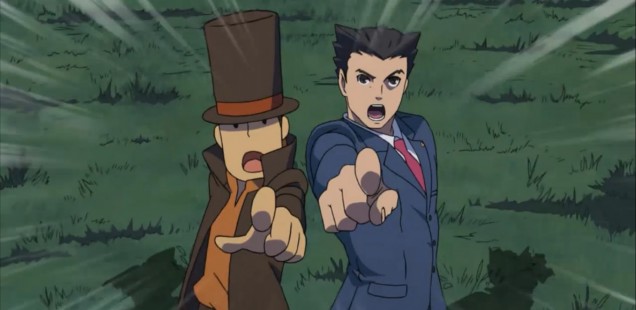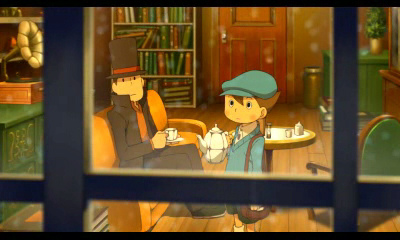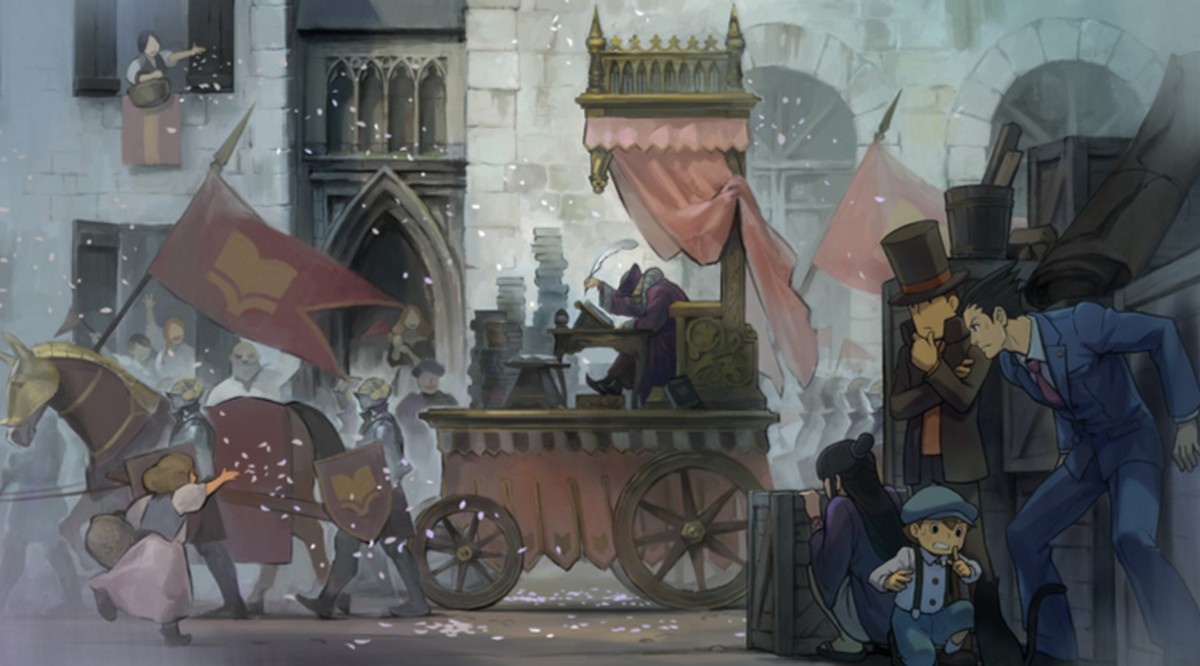
Off The Grid: Professor Layton vs. Phoenix Wright
Allison Winters just wants love, and better puzzles.
Phoenix Wright: Ace Attorney is a series that has been near and dear to me from the moment I played the first game back in 2005. Not dear enough to pick them up on release date, but dear enough to regret waiting when I returned to that magical place. I even started a slow slew of blog posts about the series to justify me playing through the games for about the fifteenth time.
Professor Layton on the other hand is a series I find both fascinating and terrifying. A game solely dedicated to clever puzzles and riddles sounds like fun, except that I am terrible at both of those and have avoided the series because of this. As a result, I know very little about the games outside of what I pick up from friends and forums. Then along came this crossover, combining both in what should have been a chocolate and peanut butter pairing to fans everywhere. What we got was more of a Mallo cup: sweet and satisfying, but not what I was looking for.
Phoenix Wright is the lovely chocolate holding the cup together: its creator, Shu Takumi, is handling the writing for this game and it shows. The interactions between Phoenix and Maya feel spot-on and natural, plus it has plenty of sly little references to the series worked in. The story may be a little too fantastical for a pure Ace Attorney plot, but manages to weave in the central duo smoothly. As a Professor Layton plot, it seems in step with what little I know of the series: weird events are happening and it’s up to Layton to solve the mystery. Getting the entire group together and implementing trial segments for Phoenix worked out. It’s only the interactions between Phoenix and Layton that are a problem.
What little characterization I’ve gathered about Layton presents him as an English gentleman with a love for solving riddles and a great number of amazing adventures under his belt. The game acknowledges that, but it doesn’t do the same for Phoenix character development, particularly events following the third game, Trials and Tribulations. I remember Phoenix stepping up to the challenge and facing the future as a strong independent person, but the crossover seems to have forgotten all this. Phoenix almost acts like a fanboy around Layton.
An early example of this problem is Layton explaining what a puzzle is to Phoenix and Maya. You mean to tell me that Phoenix, in all his years as a human being, has not once seen a puzzle? I‘m aware that at the time, Phoenix was under the town’s spell, however this town is shown to love puzzles, and he should at least be aware of what they are. This admiring attitude works for a character like Luke, his apprentice, or Maya, who would be impressed by Layton. Phoenix and Layton’s relationship should be one of mutual respect, but is written more as Phoenix just worshiping Layton.
Before I start really discussing story, I’m going to go ahead and drop a spoiler warning right now. The short version: the plot itself is fairly tight, but just doesn’t work. Skip the next three paragraphs if you don’t want to read about it.
The game is set in a fantasy-style village plagued by witches, which is later revealed as a convoluted cover-up by a rich man trying help his teenage daughter cope with her guilt over thinking she killed a town full of people. She didn’t, but explaining details would take more space than we have here. The town is actually just hidden in the countryside in present time and everyone in it is hypnotized by a special ink that cause them to think that magic and witches are real. As far as twists go, it’s not bad: everything weird in the town can be explained as elaborate smoke and mirrors.
However, it still feels like a cheap cop-out after the game takes the time to make everything seem so plausible without that twist. Elaborate rules are set up for how magic works, and we plenty of things in the games seem to defy other explanations. The revelation that none of it is real breaks the spell of the lovely world full of characters it has built. Ace Attorney games involve spirit channeling, so full-blown magic is not out of the realm of possibility in this universe. Instead, it’s the setup for a twist for the sake of a twist. Maybe I’m just a person who wants things to be fantastical and not have every single thing explained by cold science. Maybe I’m just mad that I ended up reading Shu Takumi’s attempt at writing an episode of Scooby-Doo.
Some will note that Takumi is falling into the problems that have plagued his writing after the original trilogy: current cases that conveniently help solve older cases, Maya getting put on trial, your courtroom opponent trying to recapture the Edgeworth/Phoenix dynamic. This last one is painfully blatant, as Inquisitor Barnham is Edgeworth in all but name and fashion sense. However this is not really a knock at the story as this is probably the better handling of these standbys since Ace Attorney: Investigations.
 For those who have joined us back in the spoiler free zone, the trial segments of this game are excellent. Ace Attorney fans like myself would probably have been satisfied with more of the same here, but this game also adds a few new ideas to change things up in interesting ways. Testimonies are given by multiple witnesses at the same time, as opposed to just one witness. Using one witnesses reactions allows you to get new information out of another witness. It works very well and adds a layer of depth to the trials.
For those who have joined us back in the spoiler free zone, the trial segments of this game are excellent. Ace Attorney fans like myself would probably have been satisfied with more of the same here, but this game also adds a few new ideas to change things up in interesting ways. Testimonies are given by multiple witnesses at the same time, as opposed to just one witness. Using one witnesses reactions allows you to get new information out of another witness. It works very well and adds a layer of depth to the trials.
The other half of the game consists of adventuring/puzzle solving segments and these are decent at best. The Layton fans in my life find the puzzles to be rather lackluster and despite my inexperience with the franchise, I’m inclined to agree. The puzzles seem to either be insultingly easy or frustratingly obtuse. One of the early game puzzles involves piecing together a map of the town I just arrived in, and therefore had yet to learn the general layout of. On the other hand, some of the final puzzles could be easily solved by a dog in a knight’s helm.
I know that I’m coming to this crossover solely as an Ace Attorney fan, as I’m sure others are approaching it solely as a Layton fan. This game had the opportunity to introduce both groups to something new. However, the game only makes this work in one direction. Despite Phoenix’s worship of Layton, the game doesn’t paint him in a good light. He comes of as a perfect, boring character. A few touching moments with Luke make me want to learn more about him, but it’s drowned out by him being so inhumanly flawless.
Despite all the griping I’ve being doing, I found this game enjoyable. The blandness of the Layton segments are contrasted by the crazy courtroom tomfoolery and while the destination is a let-down, the journey there is interesting. This is really more of a treat for Ace Attorney fans however. Fans of Professor Layton will not be impressed.
Allison Winters is an embalmer by trade and writer by choice who spends her free time over thinking everything. If you like what you read then you can check her out at her blog or Twitter.
